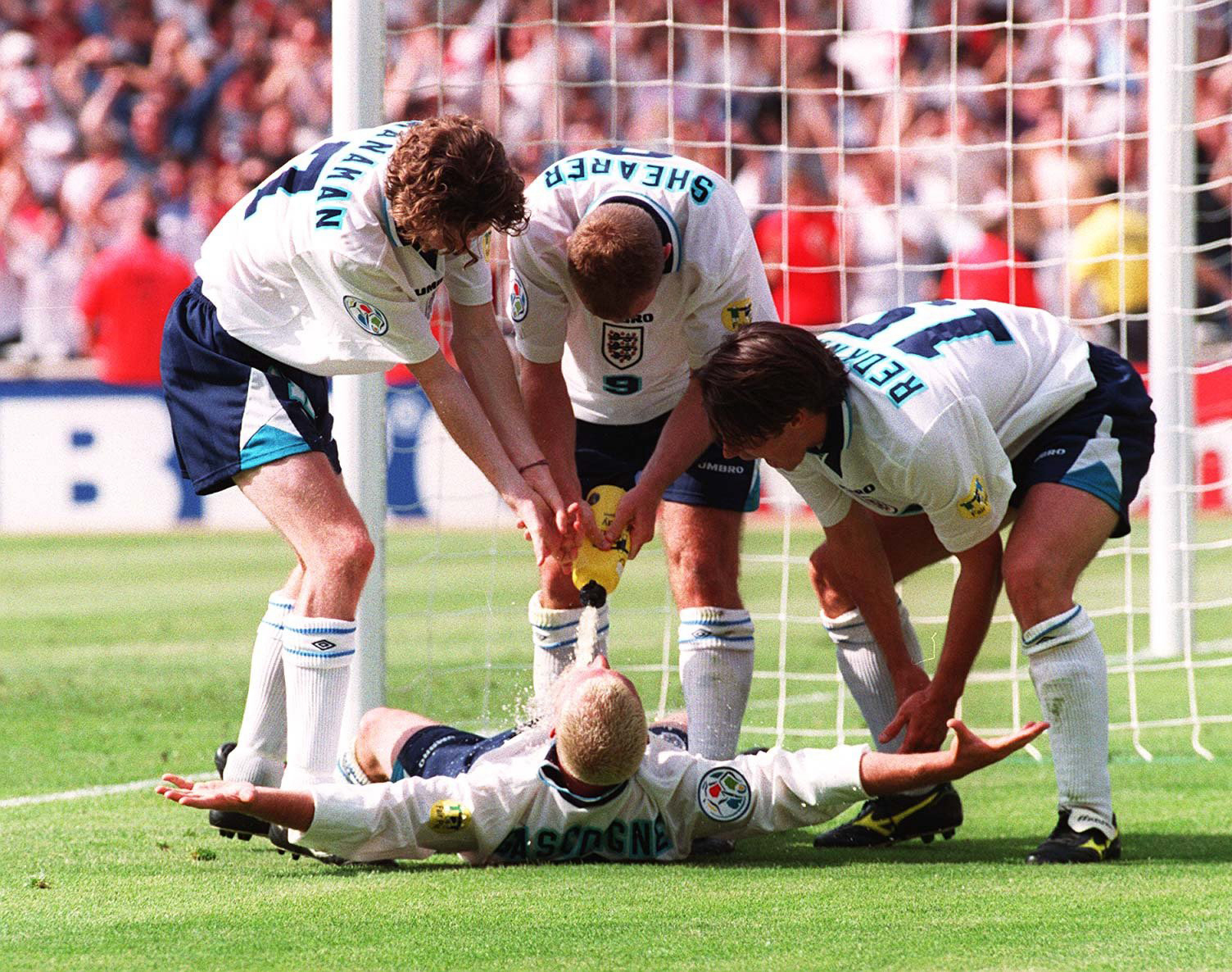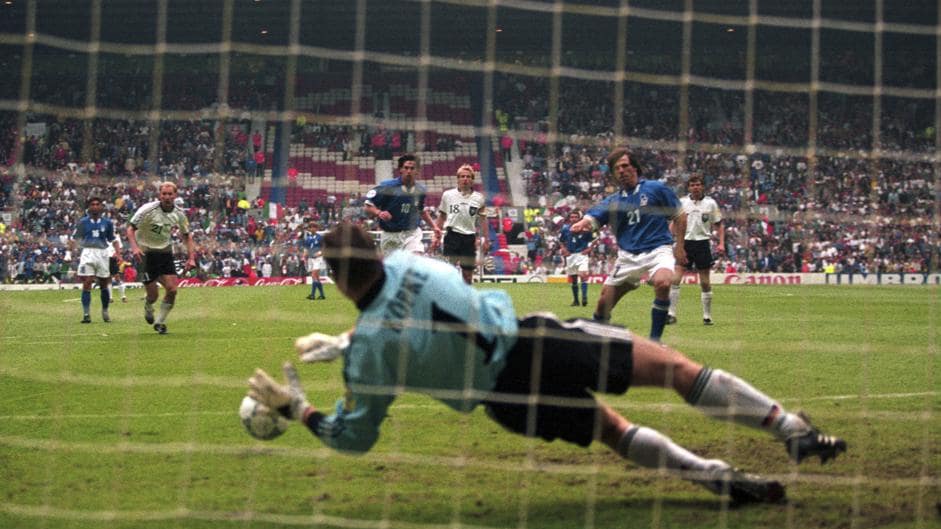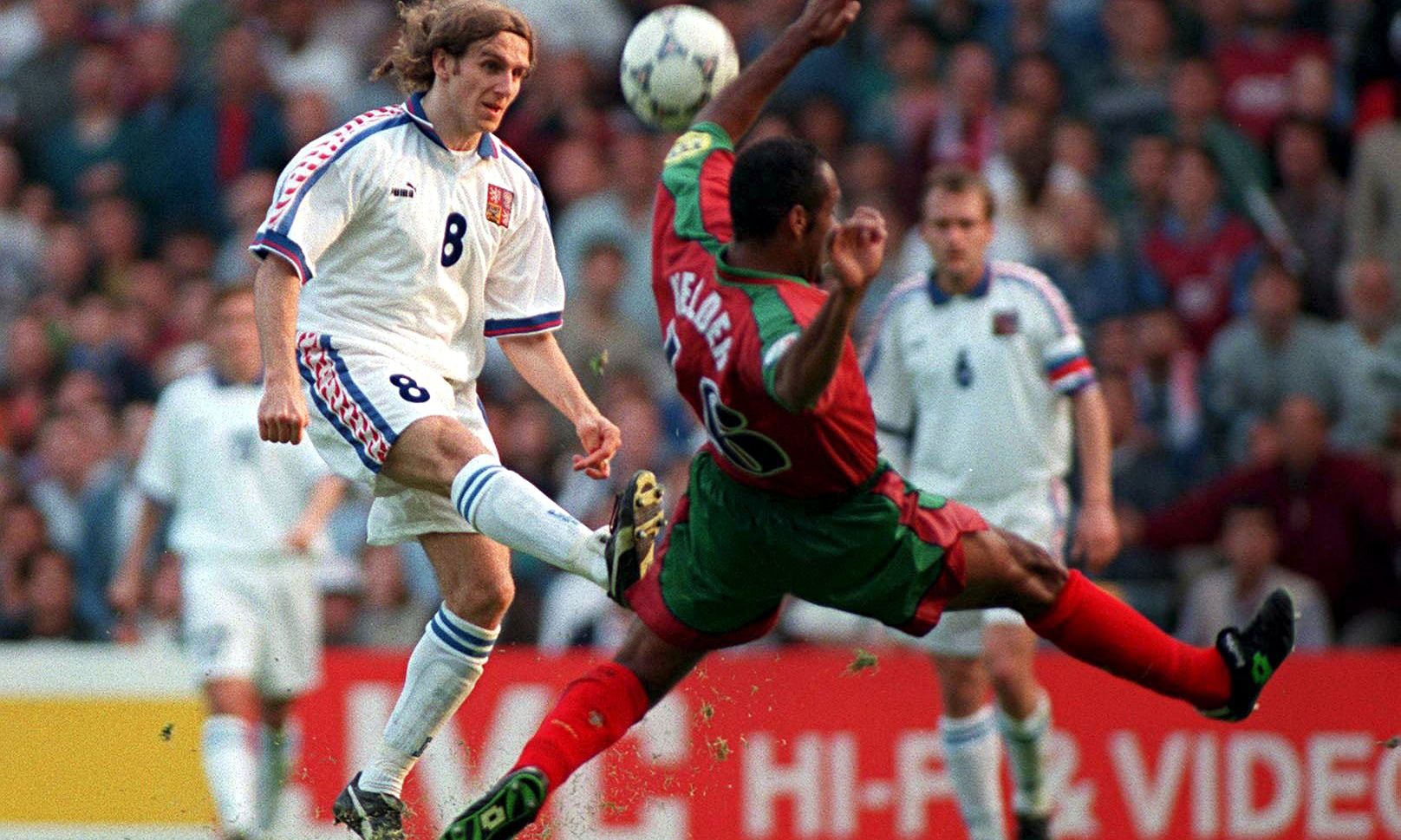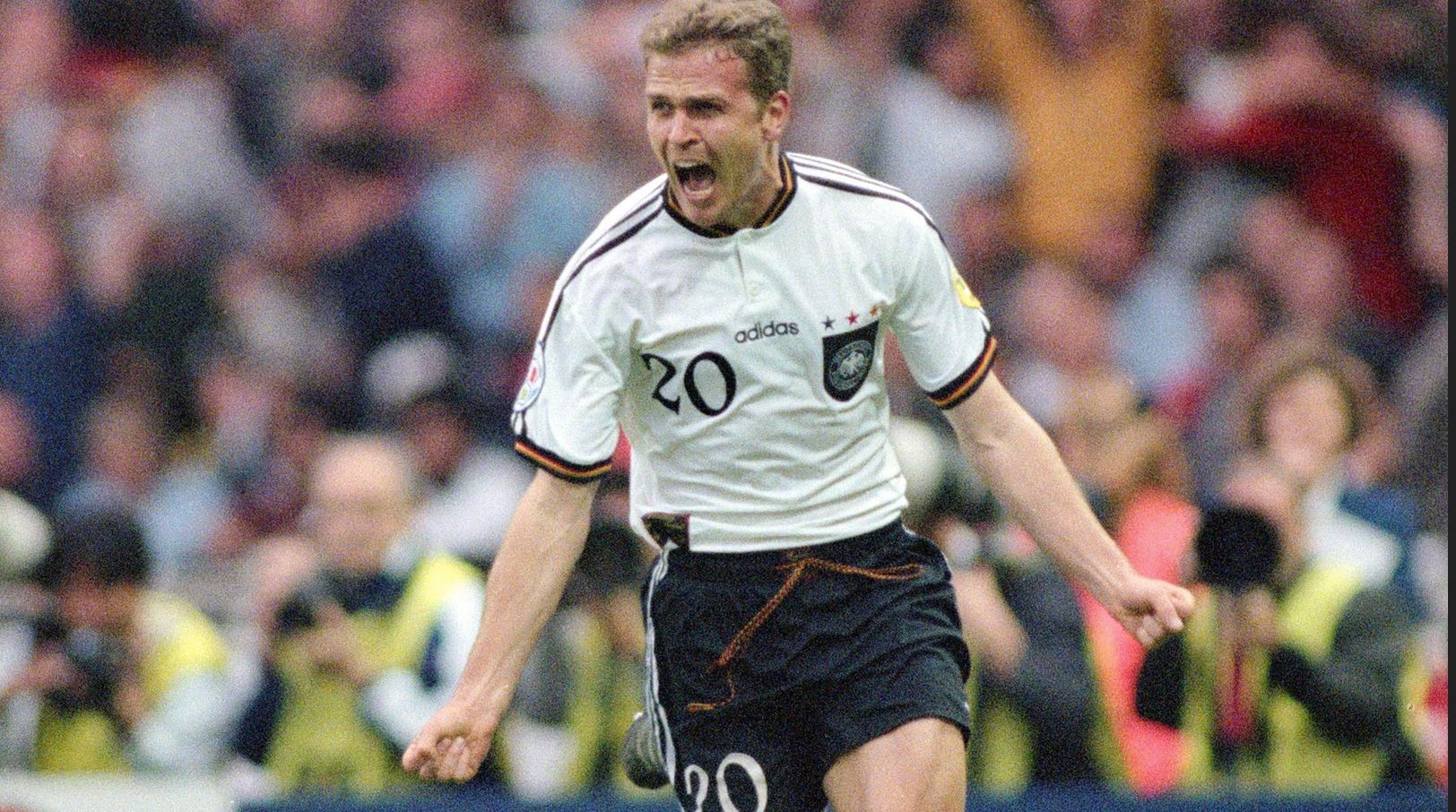Every football fan remembers their first major international tournament for many different reasons from triumph to despair. Euro 1996 had it all and was for a long time one of the most revered tournaments England have ever competed in since World Cup victory in 1966.
For one sunny month, it appeared that the Three Lions were on the verge of “bringing football home” only to be denied by a penalty save against bitter rivals Germany who would go onto triumph in the Final over the upstart Czech Republic.
The tournament though was a huge success with the continents best and brightest showing up and unleashing an incredible wave of football. For the first time, 16 teams qualified for the tournament held in England and a number of teams had their eye on the trophy.
Reigning European champions Denmark returned and retained a large part of their successful 1992 squad including Peter Schmeichel and the Laudrup brothers. Alongside the Danes there was the star-studded France team of Zinedine Zidane, Marcel Desailly and Youri Djorkaeff, Iberian neighbors Spain and Luis Figo’s Portugal. Germany, Netherlands, and Italy rounded out an exceptionally strong looking set of contenders all of whom brought talent-laden squads only serving to heighten the already palpable excitement.
Hosts England kicked the tournament off with a nervous and tense 1-1 draw against Switzerland with Alan Shearer netting his first goal in 12 matches, which would kick-start his tournament on the way to securing the Golden Boot. Rounding out England’s group were also border rivals Scotland and Netherlands.
England’s victory over Scotland treated fans to one of the best goals at the tournament courtesy of Paul Gascoigne. A long kick up field was collected by Teddy Sheringham who laid off a pass to Darren Anderton. The Tottenham midfielder lofted a first time pass through to Gascoigne who had made the run from midfield between Scotland captain Colin Hendry and his right back. With a flick of his left boot the midfield maestro lifted the ball over Hendry, watched it down onto his right, and drove home a volley to give England an unassailable lead.
This goal prompted wild celebrations from players and fans alike and led to the famous “dentist chair” celebration where Gascoigne mocked the English press following backlash to a pre-tournament night out in Hong Kong.

The Oranje and England were favorites to qualify from the group and after matching, each other with a draw and a win in their first two games the sides met at Wembley in a game that would be one England’s best performances ever at a major tournament: A stunning 4-1 win ensured they topped the group. This set up a date with the runners up of Group B, who would turn out to be Spain with France gaining the top spot.
France as expected topped Group B dispatching Romania and Bulgaria and drawing 1-1 with Spain to finish on 7 points. Spain needed a late goal from Guillermo Amor against Romania to ensure they gained the three points they needed to finish as runners up and book their spot in the Quarter-Finals.
Group C was led by the tournament favorite Germany and it was expected Italy would challenge them all the way. Sadly it was not meant to be for the Italians as they went out on a head to head with the Czech Republic suffering a 2-1 defeat. The Czech’s secured a point in their final game against Russia thanks to a last minute goal from Vladimír Šmicer to match the Italians draw with Germany as Gianfranco Zola missed a penalty for the Azzurri.

The final group contained Portugal and Denmark who were favorites to qualify, but Croatia – who were in their first major tournament as an independent country – had other ideas and had amongst their team an extremely talented collection of players led by Davor Šuker, Robert Prosinečki and Zvonimir Boban.
The Croatians won their first game against Turkey and then dispatched Denmark 3-0 with the use of an exquisite chip from Šuker over Schmeichel to really announce his nations arrival on the international scene.
Portugal and Croatia went head to head in the final match to decide the winner of the group and the Seleção ran out comfortable winners against their counterparts, topping the group and securing a Quarter-Final spot against the Czech Republic.
With the final eight set no clear favorite had established themselves. England and Spain made up the first Quarter-Final and after a tense and fraught 90 minutes plus extra time the game was decided on penalties with David Seaman saving two of the four Spanish penalties to see his side progress.
France needed penalties also to get by Holland after neither side had managed to find a breakthrough.
In the second bracket, Germany overcame a tough outing against Croatia prevailing 2-1 with Matthias Sammer netting the all-important goal just before the hour mark.
Portugal were favorites heading into the final Quarter-Final against the Czech Republic and looking ahead to setting up a mouth-watering tie with Germany but the Czech’s had other ideas and nullified the Portugal threat from Luis Figo and Rui Costa.
The coup de grace was delivered by star tournament turn Karel Poborský. A ball was fed into the midfielder in between the halfway line and the box. Immediately Poborský was surrounded by opposition players, taking a touch away from a sliding tackle, the midfielder then drove forward where a fortuitous bounce off his knee saw him through on goal.
Portugal goalkeeper Vítor Baía leapt off his line but left a huge gap over his head and steadying himself, the Czech midfielder scooped the ball right over the Portuguese and watched it bounce into the net. This gave the shot in the arm his side needed and they defended resolutely to shut out any and all attacks their opponents could muster to secure their path to the Semi-Final.

Both Semi-Finals were tight and required penalties to decide the winners. In the first encounter, France were heavy favorites against tournament newcomers Czech Republic who were competing in their first major finals since the break-up of Czechoslovakia.
After a scoreless 90 mins and extra time, the Czech Republic outlasted their counterparts 6-5 on penalties with Miroslav Kadlec netting the winning effort.
Germany then faced England in the second Semi-Final. The game was electric and both sides had multiple chances to clinch their berth in the last showdown. England took a very early lead through Alan Shearer, the striker applying the finishing touch to Tony Adam’s flick on from a Gascoigne corner.
The lead did not last long and Germany soon had parity through Stefan Kuntz who bundled home an effort past David Seaman after he had been found by a cross from Thomas Helmer. England though were not overawed by this equalizer and pressed forward for the rest of the game creating numerous chances, Sheringham having an effort cleared on the line, Darren Anderton hitting a post and Gascoigne famously missing the ball by millimeters following a Shearer cross.
With no winner for either side, penalties would once again decide the winner of the Semi-Final. Each team was perfect from the spot until current England manager Gareth Southgate had his effort saved presenting a chance for Andreas Möller to tuck home his effort and send Germany into the Final.

The Final was held at Wembley in front of 73,000 spectators and Germany prevailed after being tested by their opponents for over 90 minutes. After a scoreless first half, the Czech Republic took the lead just before the hour mark with a penalty from Patrik Berger after future Manchester United winger Karel Poborský had been felled in the area.
Like the Semi-Final, Germany did not let falling behind effect their mind-set and kept themselves in the game before finding the equalizer through Udinese man Oliver Bierhoff. The striker had stepped off the bench only four minutes prior to finding the net but netted a goal that would be a hallmark of his future career.
Christian Ziege’s long swinging free kick from the right flew over everyone’s head but out of goalkeeper Petr Kouba’s reach and Bierhoff stooped to head the ball into the net and breathe life into the injury hit German side.
Bierhoff was denied a winner in normal time by a fine stop but made sure in extra time. A long ball forward was won in the air by the striker who flicked it on to his captain and partner Jurgen Klinsmann. Klinsmann then lofted a left footed cross back over to Bierhoff who brought the ball down under his control before twisting and firing a shot that took a deflection on the way through to Kouba where the ball squirmed out of his hands dropping just inside the post much to the agony of the Czech’s.
It was the first time a major football tournament was decided via a Golden Goal, i.e. a “sudden death” rule by which the game would end in extra time when one goal was scored.
After defeat the tournament prior to Denmark, manager Bertie Vogts had his redemption and the win owed more than a little to his wife who is alleged to have told her husband to “Take Oliver Bierhoff with you, he will repay you.“
Just goes to show that women really do know best.

Read the previous episodes of our History of the UEFA Euro:
1960, The Humble Beginnings
1964, Spain’s Forgotten Glory
1968, A Year of Firsts and Lasts
1972, Dream Debut for West Germany
1976, The Year of The Panenka
1980, The Belgium Challenge
1984, Platini’s Edition to Remember
1988, Van Basten and the Dutch Conquest
1992, The Denmark Fairy Tale

